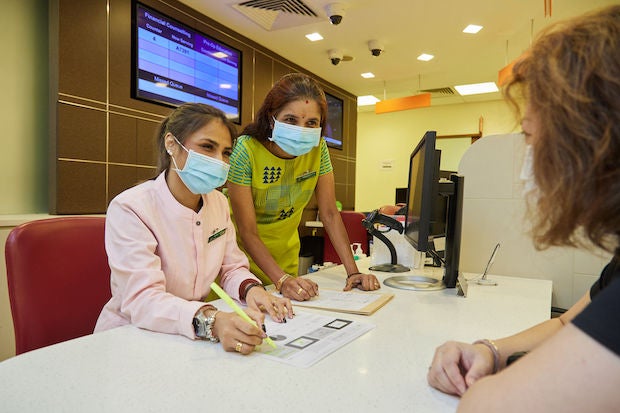
Patients scheduled for surgery will have details sent to them via SMS ahead of time, and they can consider what works best for them using detailed estimates on their Health Buddy app.
Undergoing surgery, no matter how minor, can be a scary prospect. Adding to the fear and anxiety is the worry about costs.
While patients have the process explained to them in detail, they may not fully understand or remember what they are told. For Singapore General Hospital (SGH) patients, once surgery has been confirmed, a series of steps will be set in motion to get them to think about their planned procedure and consider the costs involved.
“Once patients are scheduled for surgery, an SMS with a link to their surgery-related information in Health Buddy (SingHealth's app for patients) will be sent to them. Clicking on the link takes them to the app, where information about their pre-admission and surgery appointments, estimated costs and other information are available,” said Ms Thirvchelvi Palaniappan K, Executive, Pre-Operative Services, Division of Pre-Operative and Admitting Services (POAS), SGH. “Patients can then consider and discuss with their family members the ward and bed type they prefer before they come to SGH for their pre-admission counselling.”
Estimated costs

All aspects and details of the planned procedure are included in the care cost form, including the type of procedure that the patient will undergo, the scheduled dates, times and locations of various pre-surgery tests and investigations, financial counselling, post-surgery admission and estimated costs.
The form states what are included and excluded in estimating costs, including the average length of stay by patients undergoing specific procedures. For example, patients undergoing a total knee replacement usually stay for three days.. The costs of specialised investigations, however, are excluded, and these are accounted for in the final bill.
To make it easy for patients to decide on the ward type, there are tables showing clear comparison of the estimated total costs for A1, B1, B2 and C wards, rooms (normal and specialised, like intensive care units), and treatments for those rooms, said Ms Chelvi.
The estimates include the subsidies that Singapore citizens and permanent residents enjoy, as well as the amount they may claim under their Medisave, private, employer, government or Medishield schemes. Bills are mostly settled through a combination of Medisave, insurance and cash.
Patients opting for single or A1 class beds must offer a letter of guarantee from their insurer and place a cash deposit equal to the estimated difference if the amount in the guarantee does not cover the estimated bill. If they have outstanding bills from previous surgeries and treatments, they should settle them before surgery or opt for other ward types.
On the day of admission, patients go through another set of examinations; if they are found to be unfit, the operation will be postponed or cancelled. Tests and investigations done will have to be paid in cash as Medisave cannot be used. Should surgery be rescheduled to a date within eight weeks, pre-admission tests need not be done again.
For common procedures at SGH, such as knee replacements, giving birth and some day surgeries, packages that take the guesswork out of bills are available. These are for patients who are unlikely to suffer complications and need postsurgery step-down care. Besides surgery, the package includes standard lengths-of-stay, consumables, physiotherapy and post-surgery home visits.
If the patient faces complications during surgery, requires specialised post-operative care and further care in a step-down facility, he will be charged on a nonpackage basis that itemises services and treatments. A detailed final bill will then be sent to the patient a few weeks later.
Patients can change to another room type after surgery, and charges will be adjusted accordingly. Those who undergo surgery as private patients can change their status to subsidised for their postsurgery outpatient consultations. They will then be seen by any doctor in the surgical team under the supervision of the senior specialist. While private patients can opt for their preferred attending doctor, care in SGH, a teaching hospital, is always team-based.
Get the latest updates about Singapore Health in your mailbox! Click here to subscribe.













 Get it on Google Play
Get it on Google Play